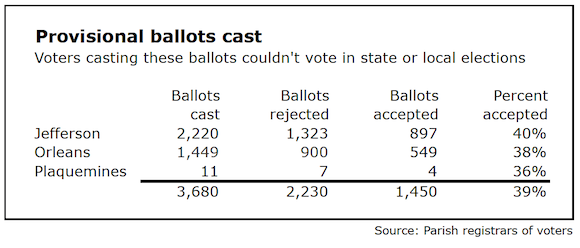
Bridge tolls might well have been removed if 1,450 provisional ballots included the issue. Photo by U.S. Army Corps of Engineers
Opponents of extending tolls on the Crescent City Connection have been asking “What if”? after learning they lost by a scant 16 votes in last week’s election.
What if they had registered more people to vote? What if they had gotten more opponents to the polls?
Here’s another what if: What would have happened if the 1,450 Orleans, Jefferson and Plaquemines voters whose “provisional ballots” were accepted had not been prevented from voting on whether to renew the bridge toll?
Because that’s exactly what happened—as people are just beginning to find out.
Consistent with state law, voters in Louisiana can request a “provisional ballot” when they show up at what they think is their voting precinct and don’t find their name in the poll book that lists eligible voters. Also consistent with state law—but in this case an obscure one passed in 2003, provisional ballots only allow for voting in federal races.
On Nov. 6, that meant provisional balloters could vote for president and Congress, but not in state and local elections, including the bridge renewal in the three parishes.
In total, 897 voters in Jefferson, 549 in Orleans and four in Plaquemines cast valid provisional ballots for president and Congress, according to numbers provided by the registrar of voters in each parish.
In all, 3,680 people cast provisional ballots in the three parishes. Of those, 2,230 were rejected by the election boards and 1,450 were allowed.
The provisional vote total leads to the key question: If those voters had been allowed to vote in local and state elections as well, could they have defeated the toll?
No one can say for sure, of course. But state Rep. Pat Connick, R-Marrero, the biggest opponent of extending the tolls, said, “They were denied the right to vote. That’s a major problem.”
Dennis DiMarco, the Jefferson Parish registrar of voters, said he did not know how many of the 897 voters who cast valid provisional ballots lived on the East Bank or the West Bank. He noted that the East Bank favored the tolls by a 51-49 percent margin while the West Bank opposed them by a 61-39 percent margin.
State Rep. Tim Burns, R-Mandeville, chairs the House committee that oversees election law. He expressed surprise that provisional ballots don’t include state and local races, saying, “That’s weird.” The issue had never come up during his year as chairman, he said.
After speaking to the Secretary of State’s office, Burns said, “I’m not saying we should change the law. But it’s worth looking at. We’re trying to get as many people as possible to vote. But you have to have integrity of the process.”
Secretary of State Tom Schedler—the state’s top elections official—didn’t return a call requesting comment.
Emile “Peppi” Bruneau, a Republican who spent 31 years in the state House representing New Orleans, sponsored the 2003 law, along with then-state Rep. Charles Lancaster, R-Metairie. The law passed unanimously in the House and overwhelmingly in the Senate, state records show.
Bruneau said he couldn’t recall why he sponsored the 2003 law but said votes on provisional ballots for federal races present fewer problems because you can vote in the wrong precinct for president or Senate, and it matters for the House of Representatives only if more than one Congressman represents a parish. That is the case in Orleans and Jefferson Parishes, which are represented by the first and second congressional districts.
“But in a local election, if someone votes for a candidate where they had no right to vote, that puts the election in question,” Bruneau said. Elections for school board and the Legislature are more likely to be decided by a few votes, he noted.
Congress permitted voters to cast provisional ballots in federal races under a 2002 law in the wake of the 2000 Florida presidential election fiasco but then left it to states to decide whether to allow votes in state and local elections as well. That led to the 2003 law.
According to the Secretary of State’s office, “A provisional voter must certify in writing on the ballot that he is a registered voter in the parish and is eligible to vote in the election for federal office before voting.”
Voters are given a provisional ballot that includes the names of presidential and congressional candidates.
The circumstances where voters cast provisional ballots are different than when they arrive to the polls without an ID and are allowed to sign an affidavit attesting to their identity. In those cases, the voter is listed in the precinct poll book.



